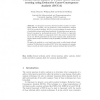Free Online Productivity Tools
i2Speak
i2Symbol
i2OCR
iTex2Img
iWeb2Print
iWeb2Shot
i2Type
iPdf2Split
iPdf2Merge
i2Bopomofo
i2Arabic
i2Style
i2Image
i2PDF
iLatex2Rtf
Sci2ools
118
click to vote
EDCC
2005
Springer
2005
Springer
Formal Safety Analysis of a Radio-Based Railroad Crossing Using Deductive Cause-Consequence Analysis (DCCA)
Abstract. In this paper we present the formal safety analysis of a radiobased railroad crossing. We use deductive cause-consequence analysis (DCCA) as analysis method. DCCA is a novel technique to analyze safety of embedded systems with formal methods. It substitutes error-prone informal reasoning by mathematical proofs. DCCA allows to rigorously prove whether a failure on component level is the cause for system failure or not. DCCA generalizes the two most common safety analysis techniques: failure modes and effects analysis (FMEA) and fault tree analysis (FTA). We apply the method to a real world case study: a radio-based railroad crossing. We illustrate the results of DCCA for this example and compare them to results of other formal safety analysis methods like formal FTA. Key words: formal methods, safety critical systems, safety analysis, failure modes and effects analysis, fault tree analysis, dependability
| Added | 27 Jun 2010 |
| Updated | 27 Jun 2010 |
| Type | Conference |
| Year | 2005 |
| Where | EDCC |
| Authors | Frank Ortmeier, Wolfgang Reif, Gerhard Schellhorn |
Comments (0)

